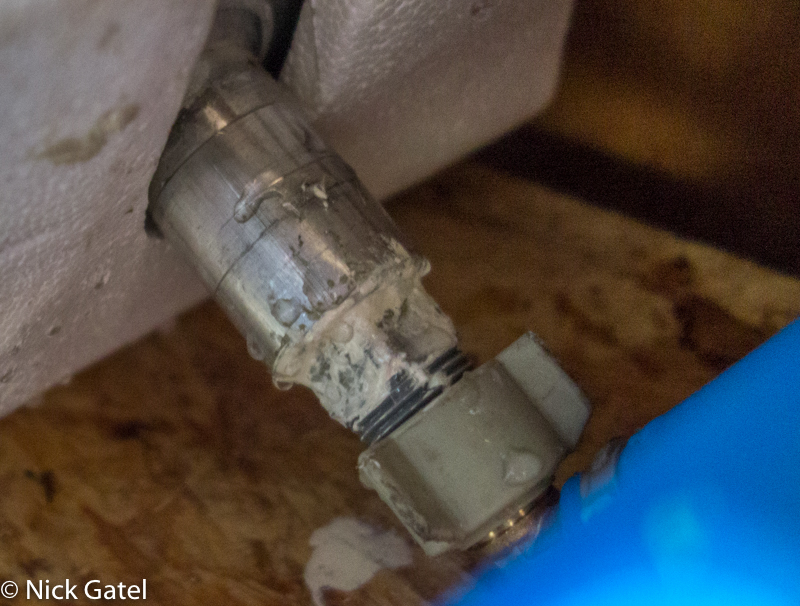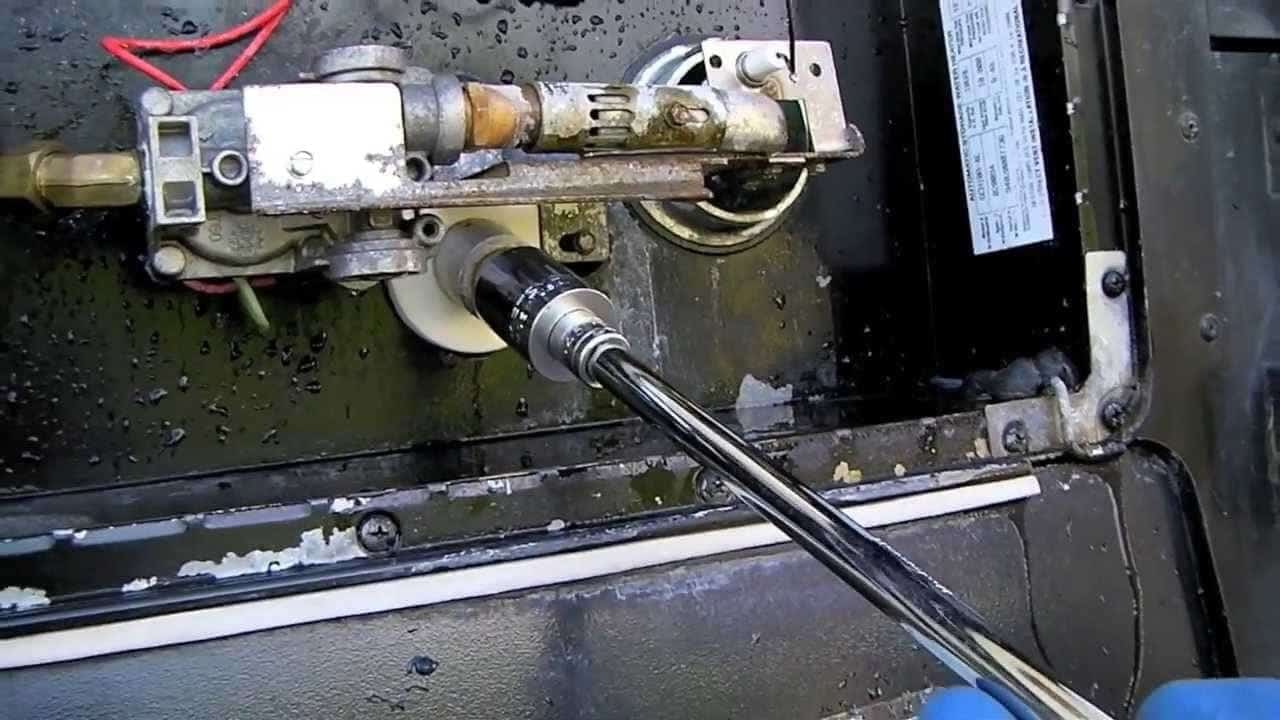Is your Atwood water heater leaking, leaving you frustrated and anxious about potential water damage? You’re not alone.
Many homeowners face this issue, and it’s crucial to address it quickly to prevent further complications. Imagine walking into your basement or garage to find a puddle forming under your water heater. It’s a sight no one wants to see, but knowing what to do next can save you time, money, and stress.
We’ll guide you through the common causes of an Atwood water heater leak, and provide you with practical solutions to fix the problem. You’ll discover simple steps to troubleshoot the issue and learn when it’s time to call in the experts. By the end of this read, you’ll feel more confident about handling a leaky water heater and safeguarding your home from unnecessary damage. Stay with us, because understanding this problem is the first step to solving it.

Credit: www.youtube.com
Page Contents
Common Causes Of Leaks
Water heaters are essential in homes for comfort and convenience. Atwood water heater leaks can disrupt this comfort. Understanding the common causes of these leaks helps in timely repairs. Below are the main reasons why your Atwood water heater might be leaking.
Faulty Valves
Valves regulate water pressure and flow inside the heater. A faulty valve can lead to leaks. Over time, these valves may wear out or become damaged. Regular checks ensure they function properly.
Corroded Tanks
Water heaters contain metal tanks that hold water. These tanks can corrode over time. Corrosion weakens the tank, causing leaks. Inspecting tanks regularly prevents serious damage.
Loose Connections
Connections link pipes and components within the heater. Loose connections can cause water to escape. Tightening these connections often solves the problem. Regular maintenance avoids potential leaks.
Quick Fixes For Leaks
Dealing with a leaking Atwood water heater can be stressful. Quick fixes can help manage the problem temporarily. These solutions are easy to apply and can save time. Before starting, make sure to turn off the water supply. This ensures safety and prevents further damage. Now, let’s explore some effective quick fixes.
Replacing Valves
Faulty valves often cause leaks. Check the pressure relief valve first. If it drips, replacing it is a good option. Ensure you get the correct valve type for your heater. Use a wrench to remove the old valve carefully. Install the new valve and tighten it securely. This simple replacement can stop leaks efficiently.
Tightening Connections
Loose connections can lead to leaks. Inspect all pipe connections around your heater. Look for any signs of moisture or dripping. Use a wrench to tighten these connections. Be gentle to avoid damaging the pipes. This step can often solve minor leaking issues.
Patch Repairs For Tanks
Small tank leaks can be patched temporarily. First, dry the area around the leak. Use a commercial patch kit for water heaters. Follow the instructions on the kit for best results. These kits usually include a bonding agent and a patch. Apply the patch over the leak and let it set. This fix should hold until a permanent solution is found.
Preventive Maintenance Tips
Preventive maintenance can extend the life of your Atwood water heater. Simple steps can prevent leaks and ensure efficient performance. Regular attention helps avoid costly repairs and keeps the heater running smoothly. Follow these tips to maintain your water heater effectively.
Regular Inspections
Inspect your Atwood water heater monthly. Look for visible signs of wear or damage. Check for rust, drips, or any unusual sounds. These could indicate potential issues. Addressing them early can prevent larger problems.
Cleaning And Flushing
Clean the heater tank every six months. Sediment buildup can cause leaks. Flushing the tank removes these deposits. Turn off the power and water supply first. Attach a hose to the drain valve and let the water flow. This process keeps the tank clean and functional.
Checking Pressure Levels
Monitor the pressure levels regularly. High pressure can lead to leaks. Use a gauge to measure the pressure. Keep it within recommended levels. Adjust the pressure relief valve as needed. This ensures safe operation and prevents damage.

Credit: popupbackpacker.com
Signs Of Serious Problems
Discovering a leak in your Atwood water heater might seem minor. Yet, it could signal serious issues. Understanding these signs ensures your water heater operates safely. Let’s explore some indicators that require immediate attention.
Persistent Leaks
A small water spot can mean big trouble. Persistent leaks often indicate internal damage. This could worsen and lead to flooding. Addressing leaks quickly prevents extensive repairs. Look for consistent drips around the heater. These are red flags. Fixing leaks early saves money.
Unusual Noises
Strange sounds from your heater are not normal. Unusual noises suggest mechanical problems. Popping or rumbling sounds can mean sediment buildup. Sediment reduces efficiency and damages the tank. Listen for hissing or screeching too. These sounds may indicate pressure issues.
Inconsistent Water Temperature
Fluctuating water temperatures frustrate many users. Inconsistent heat may reveal thermostat failure. This affects shower comfort and safety. It could also mean heating element issues. Regularly check for sudden cold or scalding hot water. These changes are warning signs.
When To Seek Professional Help
Persistent leaks from an Atwood water heater signal a need for professional intervention. Ignoring them can lead to costly damage. A skilled technician will accurately diagnose and fix underlying issues.
When your Atwood water heater starts leaking, it can be more than just an inconvenience. While some minor issues can be tackled with a wrench and a bit of elbow grease, there are times when calling a professional is the best course of action. Knowing when to seek expert help can save you from larger problems down the road.Complex Repairs
Not all leaks are equal. Some issues might involve intricate parts like valves or internal components that require specific tools and expertise. Attempting these repairs without the proper knowledge can lead to further damage. A friend once decided to fix a complex leak on his own, only to end up with water damage in his basement. The cost of professional repair was less than the damage control afterward. So, if you’re unsure about the complexity of the repair, it’s wise to consult a professional.Safety Concerns
Safety should always be your top priority. Water heaters involve both water and electricity or gas, a potentially hazardous combination if not handled correctly. Have you ever thought about the risk of electric shock or gas leaks? These are real dangers when dealing with water heater repairs. If there’s a strong smell of gas or you’re experiencing electrical issues, it’s essential to turn off your heater and call a professional immediately.Warranty Considerations
Your water heater might still be under warranty, and attempting DIY repairs can sometimes void it. Before you pick up that wrench, check your warranty terms. Professional repairs are often a requirement to keep warranties valid. Imagine the disappointment of having a major component fail and realizing your warranty is void due to an unauthorized repair. A quick call to a professional can save you from this hassle. In summary, while DIY repairs can be tempting, knowing when to call in the experts can save you time, money, and stress. Have you faced a leak that seemed too daunting to tackle alone? Share your experience in the comments!
Credit: www.thervgeeks.com
Conclusion
Dealing with a leaking Atwood water heater can feel stressful. Quick action is key. Check for visible leaks and tighten loose parts. If leaks persist, consider professional help. Regular maintenance prevents many issues. Clean your heater and inspect connections often.
A well-maintained heater lasts longer and works better. Keep an eye on it. Safety and efficiency matter in every home. Understanding your water heater ensures peace of mind. Remember, proper care saves money and time. You can handle leaks with simple steps and regular checks.
Stay proactive, and enjoy a reliable water heater.
